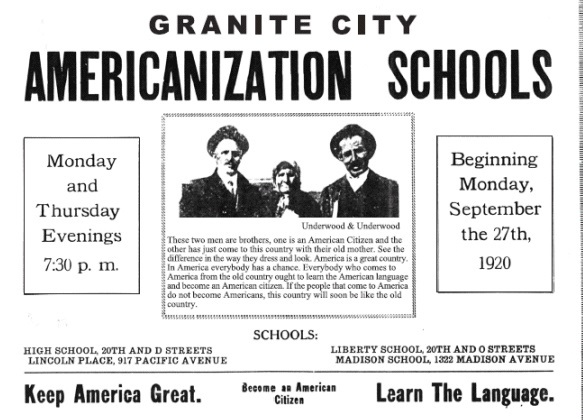Dublin Core
Title
Description
Utah's pivotal 1919 Americanization Act impacted the state's vibrant immigrant population.
When the thirteenth session of the Utah Legislature closed in March 1919, new legislation included a $4 million bond for new roads, a law preventing anarchist and communist labor agitation, as well as an Americanization Act, which required all non-English speakers to register for nightly language classes.
These bills point to an important moment in U.S. history. In the early Twentieth Century, the United States was, more than ever before, an immigrant nation. Cities hummed with immigrant energy and drive. By building new roads and infrastructure, Utah hoped to attract new industry, goods, and services. But roads bring people, and by the 1920s, not everyone was welcome.
Immigrants were viewed with suspicion – especially Eastern Europeans, who were former enemies from World War I. Worse, some immigrants harbored new and dangerous ideas, like communism, which was especially frightening in light of the recent revolution in Russia. These ideas seemed to spread via foreign language presses and pamphlets.
Utah’s Americanization Act – which became a model for legislation on the national level – seemed the perfect way to guard against foreign ideologies. So, not only did new immigrants have to learn English, they had to speak and act “American.”
Attendance at these nightly “Americanization” classes tested a new immigrant’s loyalty to the United States. Too tired to go after a long day’s work? You might be fined $25. Worse, you could be branded an un-American parasite. For example, shortly after the new law went into effect, the Price News Advocate reported, “The aliens of Price do not want to become Americans…The state is providing a school whereby they may learn our language, laws and other matters that will make better citizens out of them and they are defying the new law.”
While some officials later recognized the undue hardship imposed by the law, the notion of language as a way of measuring national identity and loyalty continues to impact immigration policy and debate.
Creator
Rebecca Andersen for Utah Humanities © 2014
Source
Image: Advertisements for Americanization schools. This particular advertisements hails from Illinois, but there were classes across the United States that taught English and "Americanization" to new immigrants. Courtesy of Teaching with Documents: Using Primary Sources from the National Archives.
______________
See Davis County Clipper, “Utah Legislature Finishes Its Work,” March 21, 1919; American Fork Citizen, “The Growing Canker in America,” March 19, 1921; Price News Advocate, “Aliens to Go to School at Night,” May 29, 1919; Price News Advocate, “Law Will Handle Lawless Element,” November 27, 1919; Price News Advocate, “Employment (?) for Aliens Who Will Not Be Americanized, Says Official,” June 22, 1922; Salt Lake Telegram, “Utah Law Used as Model in Nation—Congress Bases Proposed Americanization Legislation on Local Statute,” May 11, 1921; Galli, Craig D. “Radicals and Immigrants: Senator William H. King’s Response to Nativism, 1917-1924,” M.A. Thesis, Brigham Young University, David M. Kennedy Center for International Studies, 1984.
Publisher
The Beehive Archive is a production of Utah Humanities. Find sources and the whole collection of past episodes at www.utahhumanities.org
Date
2014-07-25

